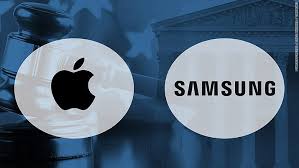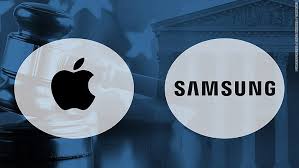
Apple and Samsung are to be fines €10m and €5m respectively by authorities in Italy on charges of “planned obsolescence” of their smartphones.
Following an investigation by the country’s competition authority, which was initiated in January this year, it was concluded that there was a negative impact on the performance of smartphones because of certain software updates by the companies.
The investigation was based on complaints that certain software updates for the operating systems in older phones by these manufacturers actually slowed down the functioning of the phones and hence the owners were pushed to purchase new models. This is perhaps the first time that action on such grounds have been taken by any regulatory authorities against the manufacturers.
Italy’s antitrust watchdog said in a statement: “Apple and Samsung implemented dishonest commercial practices” and that operating system updates “caused serious malfunctions and significantly reduced performance, thus accelerating phones’ substitution”.
The statement further claimed that no information about the potential impact of the software on their phones were provided to the customers “or any means of restoring the original functionality of the products”.
For example, the investigations found that owners of the Galaxy Note 4 models of Samsung were asked to download a new version of Google’s Android operating system which is applicable for the more recent model Galaxy Note 7. Customers complained that this resulted in the older models becoming slow.
Similarly, owners of iPhone 6 were asked by Apple to download and install an upgrade for the operating system which actually was designed for the iPhone 7 model which cause problems of slow functioning of the older phones.
The watchdog ordered the maximum fine of €5m each for both the companies and they were also ordered to issue declarations on their Italian websites about the decision of the watchdog.
An additional €5m was slapped on Apple on charges that it had avoided providing concise information to customers about the “essential” characteristics of lithium batteries such as the average life expectancy, the ways to better maintain them and how and why ot finally replace them for the iPhones.
In an acknowledgement by Apple in December last year, the iPhone maker conceded that it had intentionally asked consumers to upgrade software for iPhones that had older batteries to that the phones would not suddenly shut down. However the company denied charges that it had ever used any means to intentionally shorten the life of its products.
Later on Apple also apologised for its actions and reduced the cost of battery replacements. The company also added information about battery health to iOS and allowed users to turn off the slowing down of the iPhone’s processor.
The investigations against the companies in Italy was initiated after similar investigations ikn France at around the same time.
Under French laws, any attempt by companies to intentionally reduce the life of a product so that customers are pushed into buying new products is a crime.
(Source:www.theguaredian.com)
Following an investigation by the country’s competition authority, which was initiated in January this year, it was concluded that there was a negative impact on the performance of smartphones because of certain software updates by the companies.
The investigation was based on complaints that certain software updates for the operating systems in older phones by these manufacturers actually slowed down the functioning of the phones and hence the owners were pushed to purchase new models. This is perhaps the first time that action on such grounds have been taken by any regulatory authorities against the manufacturers.
Italy’s antitrust watchdog said in a statement: “Apple and Samsung implemented dishonest commercial practices” and that operating system updates “caused serious malfunctions and significantly reduced performance, thus accelerating phones’ substitution”.
The statement further claimed that no information about the potential impact of the software on their phones were provided to the customers “or any means of restoring the original functionality of the products”.
For example, the investigations found that owners of the Galaxy Note 4 models of Samsung were asked to download a new version of Google’s Android operating system which is applicable for the more recent model Galaxy Note 7. Customers complained that this resulted in the older models becoming slow.
Similarly, owners of iPhone 6 were asked by Apple to download and install an upgrade for the operating system which actually was designed for the iPhone 7 model which cause problems of slow functioning of the older phones.
The watchdog ordered the maximum fine of €5m each for both the companies and they were also ordered to issue declarations on their Italian websites about the decision of the watchdog.
An additional €5m was slapped on Apple on charges that it had avoided providing concise information to customers about the “essential” characteristics of lithium batteries such as the average life expectancy, the ways to better maintain them and how and why ot finally replace them for the iPhones.
In an acknowledgement by Apple in December last year, the iPhone maker conceded that it had intentionally asked consumers to upgrade software for iPhones that had older batteries to that the phones would not suddenly shut down. However the company denied charges that it had ever used any means to intentionally shorten the life of its products.
Later on Apple also apologised for its actions and reduced the cost of battery replacements. The company also added information about battery health to iOS and allowed users to turn off the slowing down of the iPhone’s processor.
The investigations against the companies in Italy was initiated after similar investigations ikn France at around the same time.
Under French laws, any attempt by companies to intentionally reduce the life of a product so that customers are pushed into buying new products is a crime.
(Source:www.theguaredian.com)














